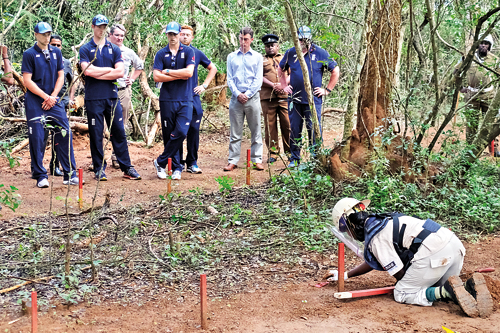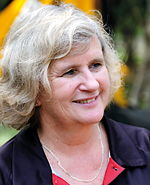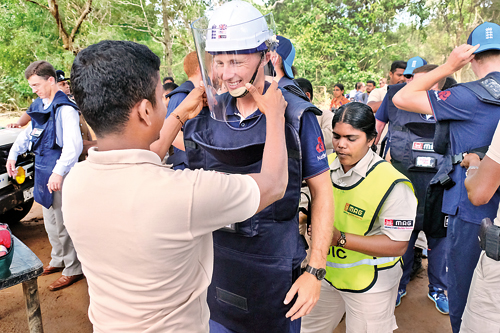Far from the playing field

A painstaking process: A MAG team member trying to uncover a mine watched by members of the English cricket team and British High Commissioner James Dauris. Pix by Amila Gamage
The trek up ahead is muddy after the rains the night before. We are greeted by warm, welcoming smiles all around but there’s an eeriness in the air and the jungle around us that harks back to a time of bloodshed and violence. We are in the heart of Periyamadu, Mannar – a frontline during the war between the LTTE and the government forces.
We are travelling with the English cricket team to the de-mining site in Periyamadu, the visit organised by the British High Commission to observe the de-mining operations conducted by Mines Advisory Group (MAG), a global humanitarian and advocacy organisation.
The trees clear into a papaw plantation and a few children run about, playing what looks to be a game of tag, just a fence separating them from the minefield.
One of the key defining aspects of the war was the line of control that divided the two parties. The line did far more than that though. It stopped people from being able to live their lives or move around freely—one of the biggest problems that still exists, owing to the deadly landmines present.
However, since 2002 MAG has been locating and removing landmines and other unexploded bombs in Sri Lanka. Thus far MAG has cleared over 42,000 mines and 14,800 other unexploded bombs and has released over 35 million square metres of land back to the community.
Their work in the Mannar district began in 2009 and a few months ago, the team moved to Periyamadu.

MAG’s Jane Cocking
As MAG’s Chief Executive Jane Cocking points out, Sri Lanka has some of the most dense minefields in the world located just north of Periyamadu. This is a major problem, since the many people who had fled their homes during the war are not able to come back because of the mines. Some make that terrible decision to take the risk and build a house in the uncleared areas, simply because they have nowhere else to go.
However, in the cleared areas people have already started to cultivate the lands and build houses etc. “The community is coming alive, because the people who had to flee their homes can come back now,” she says.
According to Jane one of the biggest problems they face is that people across the world think the landmine problem is solved. They saw Princess Diana walk across a minefield in 1997, they know about the Ottawa Treaty. But that was actually the beginning and not the end. Having the English cricket team visit and give their support, “shows that link between the work that we do clearing land and the ability of children to play sport on that land which is one of the benefits of the project. And this is just invaluable to us.”
At MAG, they take things slowly, quite literally one step at a time. The team would first sit and talk to the people in the community to find out about landmines in a particular area. The people know where things are, because some of them were there when the mines were laid. Then a map is drawn.
Shortly after, the team would do a technical survey, a meticulous scan of the land. They’d only step on the ground where a mine detector has already been through.

Safety first: England cricket captain Joe Root gets kitted up
We watch as a MAG team member carefully scans the ground around her. The buzzer in the detector goes off and she quickly gets down on her knees. She carefully begins to dig the soil. All around her the English cricket team, together with the British High Commissioner hold their breath as the earth slowly reveals a type 59 anti-tank mine.
She quickly summons her senior supervisor who carefully brushes the soil around the mine, extremely cautious to not cause any major vibrations that could possibly set it off. The team realizes that they cannot disarm the mine on their own, so they mark the spot with a red ‘X’ and the Army is called. In the case of an anti-personnel mine, we are told the team would slowly excavate, defuse and dispose of it.
Jane describes the whole operation as a “very painstaking process,” because it’s so important that they find every device and keep their staff safe in the process. “We have procedures, drills and we practise and make sure that being in a minefield is as safe as it possibly could be,” she says.
As Jane points out, to the surprise of the English team, the minefield in the Periyamadu area alone is about the size of 59 Lord’s cricket pitches. Nevertheless, they hope to be finished in the Periyamadu area within a few weeks’ time. Sri Lanka has a national landmine strategy whereby the country hopes to be free of landmines by 2020. Jane describes this as an ambitious target but adds they are doing everything in their power to reach it.
As the cricketers return, we catch up with captain, Joe Root. It’s heartening to see the work that has been put in and the land being handed back to the community that has been segregated for a long time, he tells us. “It’s nice to experience and have an idea of what it’s all about,” he says.
The team gets to do a lot of different fun things all the time but it’s also good to experience something like this as well, he says. “We are very lucky to experience these special moments and engage with the people in these communities.”
Before we leave, Jane tell us that in most cases when it comes to a landmine, the victim is almost always a child who has gone out to play. “Imagine if that were your kid who went out to play and never came back.”
The MAG team risks their lives to do what they do, and what drives them is simply a deeply held belief that everybody has an equal right to live free and happy lives. And is just what is helping to create a safer Sri Lanka.
For more information on MAG log onto – https://www.maginternational.org/what-we-do/where-we-work/
sri-lanka/


